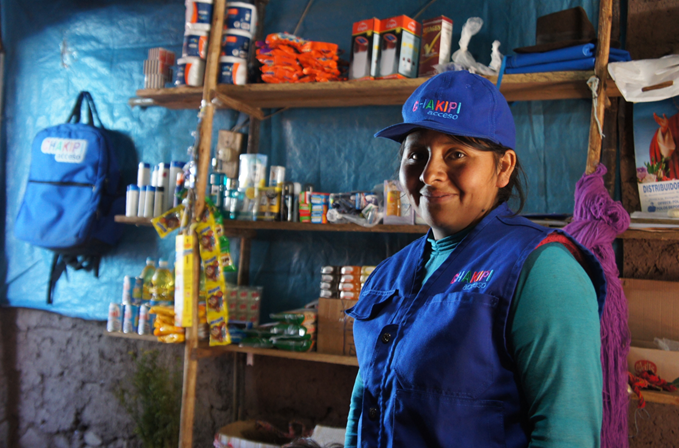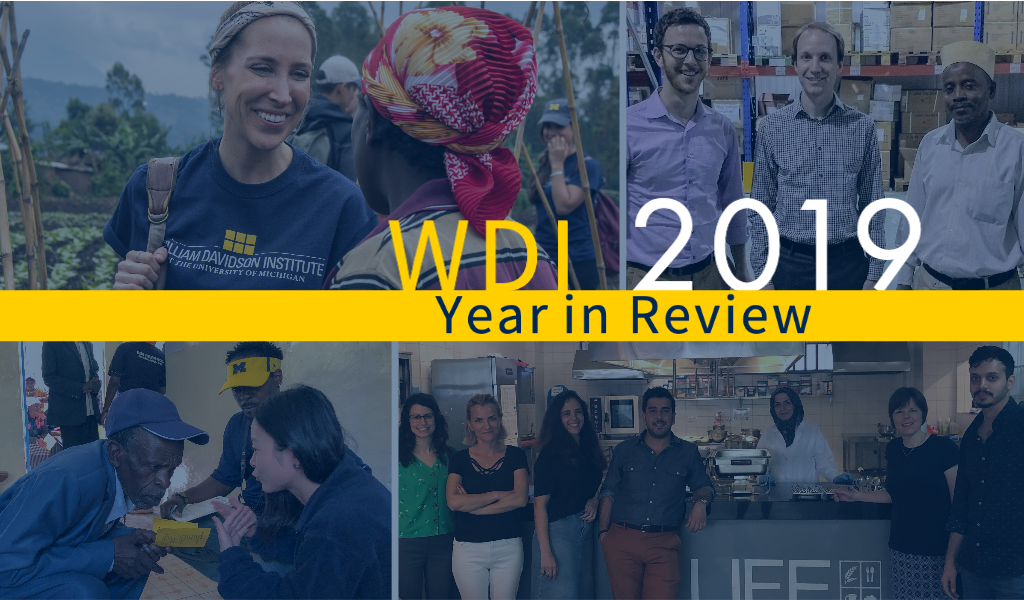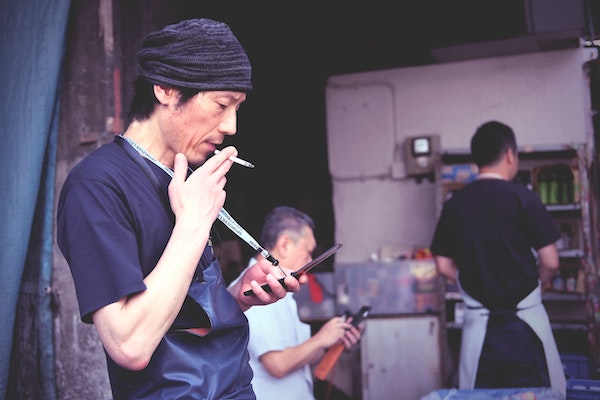This will provide crucial knowledge to help scale gender lens investing in emerging markets to deliver on gender equality.
— Carolina Robino, International Development Research Centre
Small and medium-sized enterprises (SMEs) are vital engines of growth and employment, particularly in low- and middle-income countries (LMICs). Research has shown that gender-inclusive practices can enhance both financial and social outcomes for these businesses.
WDI, in collaboration with DAI and MarketShare Associates (MSA) through USAID’s Feed the Future Market Systems and Partnerships (MSP) Activity, conducted a series of case studies highlighting how SMEs can achieve “profit with purpose” through women-inclusive business models and operations. WDI’s key role on this project was to calculate the women-inclusive return on investment which included working closely with companies to collect and collate data.
This collection of resources answers the call of the Women-Inclusive Return on Investment Investment (WI-ROI) framework to build the evidence base of ROIs from SMEs in LMICs. The case studies also provide detailed information on how the ROI was calculated to help inform those interested in calculating their own WI-ROI. The learning note and synthesis report offer guidance on selecting and vetting companies, measuring the WI-ROI, and scaling women-inclusive strategies.
These resources aim to equip SMEs with the knowledge and tools needed to implement women-inclusive practices, measure their impact and WI-ROI, and ultimately drive business growth while contributing to gender equality. The team also held a webinar in April 2024 introducing these resources and answering audience questions on the WI-ROI.
We’d love to hear your feedback or answer any questions about these resources; please contact us at WDI-PerformanceMeasurement@umich.edu
WDI collaborated with the CCA Market Strengthening Program to generate learnings from projects supported by Irish Aid. This work entailed collecting and analyzing quantitative and qualitative data from projects in CCA’s Venture Catalyst Program and User Insights Lab. The Energy team worked with the PMI team to synthesize findings across projects based on key learning questions.
WDI is supporting the learning objectives of the Clean Cooking Alliance Market Strengthening Program by developing innovative methods to measure the effectiveness of market strengthening interventions. We are providing programmatic and data support, informing programmatic adaptations and pivots, and contributing to knowledge products targeting clean cooking enterprises, funders, policymakers and other stakeholders.
Note: Please watch the recording of the talk below.
Traditional surveys and questionnaires can be imprecise methods for understanding the needs and motivations of low-income and vulnerable populations. In a Feb. 17 virtual discussion, acclaimed author and entrepreneur Daryl Collins will explore how technology can help researchers, nonprofits and businesses engage and serve these communities around the world.
During the talk, Collins will share examples of how her company, Decodis, is using technology to collect and analyze qualitative data in a more scalable and lower-cost manner. Collins will share examples of collecting data using WhatsApp audio responses to understand changes in gender norms and assessing Google Play reviews of digital lending apps in India. In both examples, Collins will share how she and her team used Natural Language Processing (NLP) – a common market tool – to detect key topics and phrases to unpack the meaning of the responses. She’ll also share how she and her team analyzed speech signals (such as pitch, duration of responses and voice modulation) in the audio files to determine whether the respondent was engaged in their responses, when the respondent was unsure, and when the respondent gave them a “canned response” — i.e., telling the researchers what he/she thought the researchers wanted to hear.
The William Davidson Institute and the University of Michigan’s Poverty Solutions are co-sponsoring the talk, which begins at 5 p.m. is free and open to the public.

Daryl Collins
As a pioneer working at the intersection of finance and human vulnerability, Collins has built a broad portfolio of work with financial service providers, foundations, bilateral donors and governments. Collins’ work is grounded in a deep understanding of the financial lives of individuals. She is the author of the ground-breaking “Portfolios of the Poor” and creator of the Financial Diaries, a research tool used in over 10 countries, including South Africa, Kenya, Mozambique and Tanzania.
People living at or near poverty levels are less likely to speak their minds when responding to surveys and other efforts to collect data. This hesitancy is understandable, but it also creates a real challenge for researchers, enterprises and policymakers to better understand their needs, said Heather Esper, Director of WDI’s Performance Measurement & Improvement group.
“Daryl Collins is truly a pioneer in collecting and analyzing data to better understand the lives of low-income and vulnerable individuals at scale,” Esper said. “The qualitative methods she uses shed more light on what individuals are saying by accounting for how they say it.”
Collins recently established Decodis with a team of linguists and Natural Language Processing data scientists. Decodis seeks to advance scale and robustness in qualitative research techniques by providing tech-led consumer research methods that are insightful, scalable and low cost. The Decodis team is currently working on a range of projects across a breadth of countries, languages and sectors to explore new ways of both collecting and analyzing open-end response data.
Collins holds bachelor’s and master’s degrees in economics from the London School of Economics and a Ph.D. from New York University. She spent the last decade as Managing Director and CEO of BFA, a niche financial inclusion consulting practice with offices in Boston, New York, Nairobi, Accra, New Delhi and Medellin.

A worker with Chakipi Acceso Peru. Image courtesy of Chakipi.
For over 10 years, the Performance Measurement and Improvement (PMI) team at the William Davidson Institute at the University of Michigan has been using robust monitoring and evaluation approaches to measure results and generate value for businesses and their stakeholders.
Whether we are working with the largest network of micro-distributors in Latin America or a multi-national business in the apparel industry, our goal is to meaningfully engage our partners in the measurement and learning process. We want to make data collection valuable for participants and data findings actionable for decision-makers at all levels of a business, organization or program.
We believe such work should be shared and include practical strategies for applying research to improve performance and generate social impact. That’s why we’ve teamed up with MIT D-Lab to write a Lean Research case study, “Positive Change Through Actionable Metrics.” Lean Research is an approach to improve the practice of data collection involving people and communities in development and humanitarian contexts. (For more information on foundations of the Lean Research approach, check out this three-part blog series on NextBillion.net.
As defined by MIT D-Lab, Lean Research is driven by four principles of good research practice:
Our team’s case study covers how we followed the Lean Research approach and applied each of the four principles to our work with three separate social enterprises. Each of these businesses wanted to strengthen their ability to collect accurate data and lead their own evaluation efforts. As a result of the work, leadership from the three enterprises gained a clearer understanding of how to measure changes in the well-being of the low-income women they work with. They also learned the importance of using both business and social indicators to improve operations.
“Thanks to this process, we were able to review the way we collect data, and create a data collection manual and survey templates for each business model [we have],” said a pilot participant from Chakipi Acceso Peru, one of the businesses in our research.
So far, MIT D-Lab has produced three such cases, which you can find here. Each case describes an example of Lean Research and discusses its results and implications for development work globally. A revised version of the Lean Research Field Guide is expected to be released soon (WDI was a contributor to that work as well!)
We plan to create more cases and practical examples of how the Lean Research framework can be applied. We’re also proud to be able to contribute to what is a robust and growing community of evaluations practitioners. Indeed, we’re always looking to work with businesses that are putting Lean Research at the forefront of their measurement goals.
Want to learn more about the work mentioned in the WDI Lean Research case study? Check out the project description on our website or read the full WDI Impact Report: Positive Change Through Actionable Metrics.

Rebecca Baylor is an Evaluation Consultant with the WDI Performance Measurement and Improvement team.

“These relationships flow both ways: faculty turn to us for help in their work and we will incorporate them in specific projects we are working on. Our work increasingly integrates our expertise between sectors within WDI as well as with the expertise across the university.”
—Paul Clyde, President of WDI
WDI teams of staff and/or students worked on nearly 50 projects in more than 30 countries in 2019. Our work focused on our core consulting sectors – education, energy, finance and healthcare, as well as our management education programs, entrepreneurship development, measurement and evaluation services and the deployment of University of Michigan graduate students around the world. In the course of the year, WDI worked with faculty and researchers at the U-M Ross School of Business, the Zell Lurie Institute, Law School, the School of Public Health, the College of Engineering, the School of Nursing, the College of Literature, Science and Arts, School of Education, College of Pharmacy, Medical School, Kellogg Eye Center, School of Information, and the School of Environment and Sustainability.
“Our work capitalizes on the expertise of our staff as well as the expertise across campus,” said WDI President Paul Clyde. “Over the past 12 months we have worked with 30 faculty and many students from Ross but also students and/or faculty from a number of other schools within U-M. These relationships flow both ways: faculty turn to us for help in their work and we will incorporate them in specific projects we are working on. Our work increasingly integrates our expertise between sectors within WDI as well as with the expertise across the university.”
Here is a closer look at some highlights from 2019:
The Education consulting sector and its Entrepreneurship Development Center (EDC) continued its work on the LIFE Project, which supports refugees in Turkey as they become entrepreneurs in the food sector. In July, WDI staff members Amy Gillett and Kristin Kelterborn and faculty affiliate Eric Fretz visited the Turkish cities of Istanbul and Mersin. Watch a narrated slideshow below of their trip that details the work they did while there and the program graduates they met. Gillett and Kelterborn also wrote an article for WDI’s affiliated NextBillion website on how to accelerate the success of refugee entrepreneurs.
Building off the success of its M2GATE Program (for more on the program, watch a video below here), WDI’s Education sector is facilitating a new virtual exchange course at the U-M Ross School of Business. Read about Business & Culture: A Virtual Practicum here. And read a WDI Impact Report on virtual exchange written in March.
The Education team also delivered another successful leadership workshop for NGOs in Central and Eastern Europe. Watch an entertaining and informative video on the latest workshop here. The next NGO workshop will take place in May 2020 in Warsaw, Poland.
WDI’s Energy consulting sector, established formally in 2018, explored the hot topic of renewable mini-grids to increase energy access. Specifically, the energy team is beginning to work with local partners in the Bagladeshi village of Bagdumur to determine the viability of a mini-grid there. In early 2019, WDI also deployed graduate students from the U-M’s School for Environment and Sustainability to study how energy enterprises in India and Uganda perform and how best to document it.
WDI’s Healthcare consulting sector team members Michael Krautmann and Ben Davis traveled to Tanzania for a U.S. Agency for International Development project to help strengthen that country’s health supply chain systems. Krautmann also sat down for a Q&A about his supply chain work at WDI, and Healthcare sector faculty affiliate Ari Schwayder answered five questions about his favorite health projects to work on.
WDI’s Healthcare team also conducted a project with the Linked Foundation to inform social enterprise, med-tech, digital health, and private sector investment in Latin America. The Foundation seeks to identify market-based, impact investment opportunities specific to women’s health in Latin America, based on an integrated assessment of the major unmet needs in combination with identification of high-impact solutions and opportunities to foster the enterprise ecosystem and sustainable women’s health solutions. WDI developed an analytic methodology, conducted a landscaping study for Colombia and Peru, and will be publishing the report in January 2020. WDI and the Linked Foundation also had the opportunity to present project findings at four conference settings in the U.S. and Latin America in fall 2019. Linked anticipates this work will inform their investment strategy and catalyze additional resources to the most-needed areas in women’s health in Latin America.
WDI President Paul Clyde wrote an article exploring the profit potential for health care companies in low- and middle-income countries.
WDI Vice President for Healthcare Pascale Leroueil continued her work helping global health organizations such as Global Fund, Gavi and WHO to increase the impact of their investments.
At the beginning of 2019, WDI Vice President of Administration Claire Hogikyan traveled to Ethiopia as the first phase of work to help that country find a sustainable solution to its medical waste problem. Her trip led to the deployment of a team of Ross School graduate students a couple of months later. They developed a proposal that was presented to government officials by an organization that plans to begin operations in early 2020 of a medical waste incinerator outside Addis Ababa.
WDI’s Finance consulting sector partnered with the Ross School of Business and Professor Gautam Kaul on a first-of-its-kind curriculum-based, student-run international investment fund.
The Finance sector team also partnered with Awash Bank in Ethiopia to study a remittance program to increase peoples’ access to capital. How the program would work is explained in this infographic and in this concept note.
In 2019, the Performance Measurement & Improvement (PMI) team continued work on several ongoing projects, including whether developmental evaluation works in a USAID context and using impact data to develop strategies to increase engagement of women in Colombia’s coffee sector. PMI Senior Research Associate Rebecca Baylor also shared her views in an article exploring whether developmental evaluation is an appropriate assessment strategy.
PMI also collaborated with other WDI consulting sectors such as Education, Energy and Healthcare to provide assessment services on their projects, including evaluating the impact of the Business and Culture course. Working alongside the PMI team on that project is WDI Faculty Affiliate Andy Grogan-Kaylor. Read a Q&A about his work and why he enjoys collaborating with the PMI team.
The PMI team also attended several conference proceedings in the impact measurement field and often spoke on panels and roundtables about their work. They led several discussions at the November 2019 American Evaluation Association annual conference. After attending and moderating a discussion at a global metrics conference, Baylor wrote about what is being done to incorporate gender equality into the impact measurement space.
The past year featured several opportunities for University of Michigan students to participate in WDI-sponsored projects. In all, 76 U-M students traveled abroad for WDI work.
Occasionally, students may participate in multiple WDI-sponsored projects. To reward these hard-working, committed students, WDI established the Davidson Field Scholar program. There are currently nine students who have earned this honor.
WDI sponsored 11 Multidisciplinary Action Project (MAP) teams in 2019, and deployed five teams to five countries to study ways to improve healthcare delivery there. One MAP team member who worked in Rwanda recorded her thoughts about the project for a narrated slideshow. (See below).
And we also caught up with a couple of former students – one in South Korea and the other in India – who participated in WDI student projects to see how working on these projects impacted their career paths.
“While I knew it would serve as a useful resource, I did not realize just how helpful the Institute would be until I got to Ross and started interacting with the staff and professors associated with WDI,” Puneet Goenka, WDI alumnus said.
And as part of the WDI Global Impact Speaker Series, the Institute hosted four guest speakers – Sally Stephens of Medicines360; Tami Kesselman of Aligned Investing Global; Ujjwal Kumar of Honeywell and Efosa Ojomo of the Clayton Christensen Institute. Watch an interview with Stephens here; an interview with Kesselman here; and watch Ojomo’s talk here.

Photo by Erica Leong on Unsplash
Government health ministries in low- and middle-income countries (LMICs) have historically struggled to adequately fund healthcare services for their citizens. But as these countries transition away from donor funding over the next two decades, many will need to find new domestic revenue streams to finance these services. A new WDI white paper explores the impact of raising additional government revenue through increased tax rates on “bads,” such as tobacco, alcohol and sugary drinks.
The paper, “Revenue Estimates from Taxing ‘Bads’ in 16 Low- and Middle-Income Countries,” estimates the additional revenue generated in 2016 had higher excise tax rates been imposed on tobacco, alcohol and sugary drinks and then compares this revenue to select national economic indicators. The analysis included 16 low- and middle-income countries: Côte d’Ivoire, Democratic Republic of the Congo, Ethiopia, Haiti, India, Lao People’s Democratic Republic, Moldova, Myanmar, Niger, Papua New Guinea, Rwanda, Senegal, Sierra Leone, Tajikistan, Tanzania and Togo.

Ben Davis
“The key finding is that increased excise tax rates that result in only a modest increase in retail price can still generate an important amount of additional revenue relative to current health expenditure,” said Ben Davis, a research manager with WDI’s Healthcare sector. Davis wrote the paper with Pascale Leroueil, vice president of WDI’s Healthcare sector, and William Savedoff, senior fellow at the Center for Global Development.
The simulations showed that in 14 of the 16 countries, a tax increasing retail price by 17% could generate additional revenue that is more than 50% of the amount these governments currently spend from their own budgets on healthcare. For 7 of the 16 countries, additional revenue is more than 100% of that amount.
Davis emphasized that the study has limitations. For example, estimates do not account for income and cross-substitution effects (or when consumers switch to cheaper alternatives when a product’s price rises), and they are not adjusted based on historical experience in raising tax revenues.
While the results of the current study are broadly aligned with those recently produced by the Bloomberg Philanthropies’ Task Force on Fiscal Policy for Health, there is a slight difference in methodology. The method used by Davis and his fellow authors allowed them to incorporate several different data sources and calculation methods in the final revenue estimates. Input data were obtained from public databases, journal articles, and LMIC government websites and then used in either a “bottom up” or a “top down” calculation. The “Bottom up” calculation begins with data showing how often individuals consume tobacco, alcohol and sugary drinks while the “top down” calculation begins with the amount of money actually collected by LMIC governments that taxed these products.
Davis said these estimates could act as a starting point for a discussion between global donor organizations and country governments. “A government stakeholder might say, ‘These results are interesting. An increased excise tax on these products might be worth considering. Let’s do a deeper analysis to make sure these numbers reflect reality when we take into account all of the factors that couldn’t be captured in the initial study.’”
“This paper is a small part of a larger conversation about domestic revenue mobilization and healthcare financing in low- and middle-income countries,” Davis said. “It is a building block.”